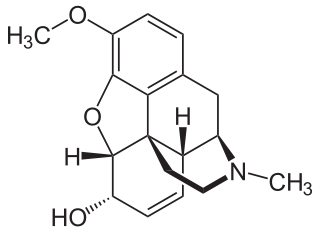
Paracetamol, or acetaminophen, is a non-opioid analgesic and antipyretic agent used to treat fever and mild to moderate pain. It is a widely used over-the-counter medication. Common brand names include Tylenol and Panadol.

Tylenol is a brand of medication, advertised for reducing pain, reducing fever, and relieving the symptoms of allergies, cold, cough, headache, and influenza. The active ingredient of its original flagship product is paracetamol, an analgesic and antipyretic. Like the words paracetamol and acetaminophen, the brand name Tylenol is derived from a chemical name for the compound, N-acetyl-para-aminophenol (APAP). The brand name is owned by McNeil Consumer Healthcare, a subsidiary of Kenvue.

Advil is primarily a brand of ibuprofen. Advil has been called a "megabrand" because it offers various "products for a wide range of pain, head cold, and sleep problems."

Phenacetin is a pain-relieving and fever-reducing drug, which was widely used following its introduction in 1887. It was withdrawn from medicinal use as dangerous from the 1970s.
Oxycodone/aspirin is a combination drug marketed by Endo Pharmaceuticals. It is a tablet containing a mixture of 325 mg of aspirin and 4.8355 mg of oxycodone HCl ; it is an opioid/non-opioid combination used to treat moderate to moderately severe pain. The safety of the combination during pregnancy has not been established, although aspirin is generally contraindicated during pregnancy, and the drug has been placed in pregnancy category D. Inactive ingredients include D&C Yellow 10, FD&C Yellow 6, microcrystalline cellulose, and corn starch. Percodan was first marketed by DuPont Pharmaceuticals and prescribed in the United States in 1950. Once a widely prescribed painkiller, it has largely been replaced by alternative oxycodone compounds containing paracetamol (acetaminophen) instead of aspirin, such as Percocet.

Dihydrocodeine is a semi-synthetic opioid analgesic prescribed for pain or severe dyspnea, or as an antitussive, either alone or compounded with paracetamol (acetaminophen) or aspirin. It was developed in Germany in 1908 and first marketed in 1911.

Excedrin is an over-the-counter headache pain reliever, typically in the form of tablets or caplets. It contains paracetamol, aspirin and caffeine. It was manufactured by Bristol-Myers Squibb until it was purchased by Novartis in July 2005 along with other products from BMS's over-the-counter business. As of March 2015, GSK holds majority ownership of Excedrin through a joint venture transaction with Novartis. On July 18, 2022, GSK spun off its consumer healthcare business to Haleon.
BC Powder is an American brand of over-the-counter analgesic pain reliever owned by Prestige Consumer Healthcare and manufactured in Washington, DC.

Midol is a brand of over-the-counter analgesic drugs marketed for menstrual cramping and other effects related to premenstrual syndrome and menstruation. Various subbrands are formulated using different active ingredients. Midol is distributed by Bayer.
Goody's Powder, also called Goody's Headache Powders, is an over-the-counter aspirin/paracetamol/caffeine–based pain reliever, in single-dose powder form, which is marketed and sold by Prestige Brands. The powder delivery saves the time needed for the patient's digestive system to break down a tablet or capsule, ostensibly causing the medication to work faster. Goody's Extra Strength Powder consists of aspirin, caffeine, and paracetamol (acetaminophen) in a formula identical to that of Excedrin, a product of Novartis, but in the no-digestion-needed powder form.
Propyphenazone/paracetamol/caffeine is an analgesic combination indicated for the management of headache. It contains the analgesics propyphenazone and paracetamol and the stimulant caffeine.
Prestige Consumer Healthcare Inc. is an American company that markets and distributes over-the-counter healthcare and household cleaning products. It was formed by the merger of Medtech Products, Inc., Prestige Brands International, and the Spic and Span Company in 1996. The company is headquartered in Tarrytown, New York and operates a manufacturing facility in Lynchburg, Virginia.
Aspergum is the United States trademark name for an analgesic chewing gum, whose active ingredient is aspirin. Aspergum is owned by Retrobrands USA LLC.

Codeine is an opiate and prodrug of morphine mainly used to treat pain, coughing, and diarrhea. It is also commonly used as a recreational drug. It is found naturally in the sap of the opium poppy, Papaver somniferum. It is typically used to treat mild to moderate degrees of pain. Greater benefit may occur when combined with paracetamol (acetaminophen) or a nonsteroidal anti-inflammatory drug (NSAID) such as aspirin or ibuprofen. Evidence does not support its use for acute cough suppression in children. In Europe, it is not recommended as a cough medicine for those under 12 years of age. It is generally taken by mouth. It typically starts working after half an hour, with maximum effect at two hours. Its effects last for about four to six hours. Codeine exhibits abuse potential similar to other opioid medications, including a risk of addiction and overdose.
Anadin is a brand of painkiller sold in the UK and Ireland, launched in 1932, originally by American pharmaceutical company Anacin and currently by Haleon.
Aspirin/paracetamol/caffeine is a combination drug for the treatment of pain, especially tension headache and migraine. It contains aspirin, a non-steroidal anti-inflammatory drug; paracetamol (acetaminophen), an analgesic; and caffeine, a stimulant.
Vincent Chemical Company was an Australian business noted for manufacture of a popular compound analgesic "Vincent's APC"
Nurofen is a brand of range of pain-relief medication containing ibuprofen made by the English-Dutch company Reckitt Benckiser. Introduced in 1983, the Nurofen brand was acquired following Reckitt Benckiser's acquisition of Boots healthcare international in 2005 for £1.93 billion, which included Nurofen, Strepsils, and Clearasil. The brand is primarily marketed and sold in the United Kingdom, other parts of Europe, South Africa, Australia and New Zealand. In 2016, it was the biggest selling branded over-the-counter medication sold in Great Britain, with sales of £116.8 million.

Askit Powders was a proprietary brand of headache cure sold primarily in the UK. The product combined aspirin, aloxiprin and caffeine.









